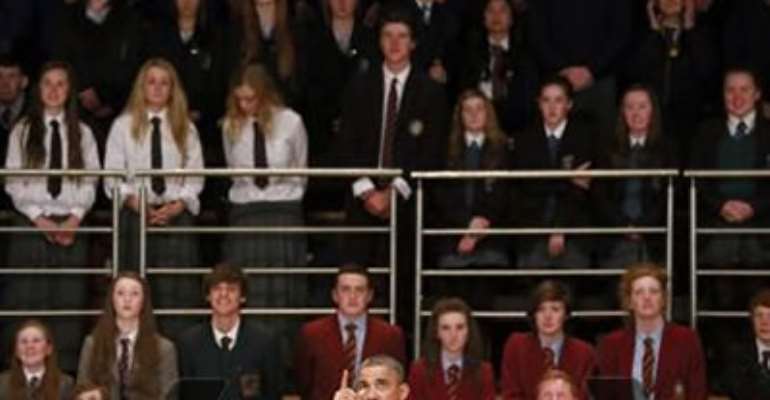West Scolds Putin Over Syria Before G8 Meeting

Western leaders rebuked Russian President Vladimir Putin for supporting Syria's Bashar al-Assad in his battle to crush an uprising, setting the stage for what could be a tense two-day G8 summit.
U.S. President Barack Obama is expected to use his first face-to-face meeting with Putin in a year to try to convince the Kremlin chief to bring Assad to the negotiating table to end the two-year-old conflict.
British Prime Minister David Cameron, who is chairing the G8 summit, acknowledged there was "a big difference" between the positions of Russia and the West on Syria.
After Putin warned Obama of the dangers of arming Assad's foes who he claimed ate human body parts, Moscow said it would not permit no-fly zones to be imposed over Syria.
"I think we fundamentally will not allow this scenario," Foreign Ministry spokesman Alexander Lukashevich said in Moscow.
"All these maneuvers about no-fly zones and humanitarian corridors are a direct consequence of a lack of respect for international law."
Western leaders criticized Russia, Assad's only big-power ally, for delivering arms to Assad while the rebels perished.
"How can we allow that Russia continues to deliver arms to the Bashar al-Assad regime when the opposition receives very few and is being massacred?" French President Francois Hollande said.
The United States, stung by recent victories for Assad's forces and their support from Hezbollah guerrillas in the civil war, said last week it would step up military aid to the rebels including automatic weapons, light mortars and rocket-propelled grenades.
The European Union has also dropped its arms embargo on Syria, allowing France and Britain to arm the rebels, though Cameron expressed concern about some of Assad's foes.
"Let's be clear - I am as worried as anybody else about elements of the Syrian opposition, who are extremists, who support terrorism and who are a great danger to our world," Cameron said.
Obama and Putin are due to meet at about 6:30 pm local time at the Lough Erne golf resort about 10 km (7 miles) outside the Northern Irish town of Enniskillen, scene of an IRA bomb attack in 1987 that killed 11 people.
Security was tight and the venue was surrounded by a high steel fence, though Cameron was keen to showcase the relative peace in Northern Ireland as it tries to attract investment after decades of trouble.
In a speech in Belfast, Obama urged young people in Northern Ireland to finish making "permanent peace" and set an example to other areas of the world stricken by conflict.
Cameron could also face some awkward questions at the G8 table after a Guardian newspaper report that Britain spied on officials taking part in two Group of 20 meetings in 2009.
U.S.-EU TRADE TALKS
The leaders of the United States, Japan, Canada, Russia, Germany, France, Britain and Italy - representing just over half of the $71.7 trillion global economy - will also discuss global economy and trade.
The leaders of the EU and United States are due to announce the start of formal negotiations on a free trade deal that could be worth more than $100 billion a year to each economy.
"We expect the negotiations to start as soon as possible, most likely July," European Commission President Jose Manuel Barroso said.
Japanese Prime Minister Shinzo Abe, German Chancellor Angela Merkel and other leaders will probably discuss the role of central banks and monetary policy.
They are likely to say they are not content with progress so far in fixing their economies in the wake of the global financial crisis, according to a draft communique seen by Reuters.
Abe will use the opportunity to explain his blend of fiscal and monetary stimuli known as 'Abenomics' to the leaders as investors try to absorb the implications of a signal by the U.S. Federal Reserve it may start to slow its money-printing.
REUTERS
